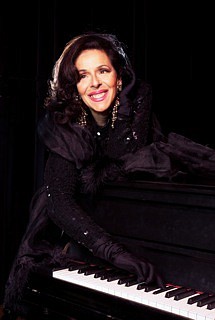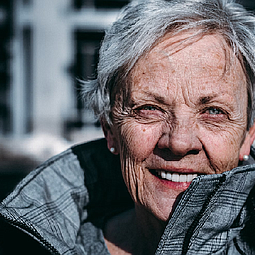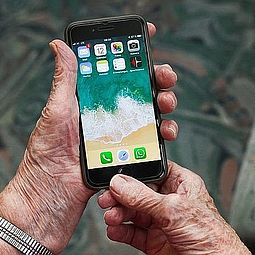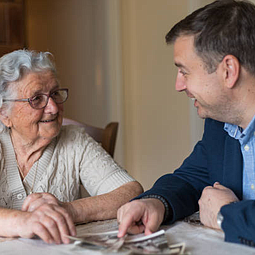The Joys of Singing
February 3, 2014 at 6:00 a.m.
Often a turning point arrives in young people’s lives when they realize their passions.
I grew up in a cacophony of music. My older brother Norman was a classical pianist and it was a reassuring sound to hear him practicing in his basement studio of our Ballard home. He was good from an early age and would someday play concerts. I was sure of it.
Both our parents had a strong attraction to the popular music of their day. My dad loved big band jazz and vocalists including, Ella, Billy, and Dinah, plus Mario Lanza and Jerry Vale—his favorites. My mother loved Tom Jones, Eddy Arnold, Ray Price, Ray Charles, and Judy Garland.
I learned so many songs by osmosis. The stereo in our dining room was often playing, especially late at night or early in the morning and most of the weekends when our father cooked up his famous spaghetti sauce. We kids had our own stereo systems too. It was just a given that these were basic necessities everyone should have, like a bed and a dresser.
My mother remembers that, around nine, I played my 45’s (small vinyl records) and sang along with the artist, studying myself in the mirror. So at a young age, I had that glint of wanting to be a professional singer. You know the kind, a diva who would wear gorgeous sparkling clothes, while people listened and danced as she (as I) commanded the center of attention. This was something I longed for as a kid but never seemed to know how to get.
That dream never felt real until my senior year in high school when my older brother Norman and his friend Matthew held a party in Matt’s rec room.Mate and Norman did their “nightclub routine.” Matt on piano and Norman singing.
The night of the performance, I was riveted by the mystique and professionalism of their performance—mesmerized by this other side of my brother I had never seen. He seemed hip and jazzy, all eyes upon him. I was under the spell of this muse. He sang numbers like “Getting to Be a Habit with Me” and “Just One of Those Things.” I loved the double entendres, and the energy of Matthew’s piano playing and Norman’s song interpretations made huge impressions on me.
Their performance seeded my dream. Norman already had his classical musician dream—which came true.
As a kid, I was curious about Norman’s popular music book stashed between his classical music pieces. I had no interest in that classic stuff. I sat on his cold studio floor when he wasn't home and went through the thick book, looking for a song I recognized and could sing. I didn't know too many songs other than the ones we had learned in school and the ones my parents listened to.
I wondered how one learned to read those magical notes and make a song come alive. Though I sadly imagined it wouldn't be my talent, I loved reading the lyrics and desperately wanted them to brig them to life.
Occasionally, my brother got bored practicing and took time out for some comic relief. He’d play some of those songs from that big book of Special Occasion Favorites. “Roses And Lollipops” was a favorite of mine. He’d invite me to sing and sort of teach them to me, laughing at my feeble attempts.
Because he didn't know how to transpose a song into my key, and my voice didn't always fit the key originally used, I admit, I did sound comical. Erroneously, I felt that meant I couldn't sing.
Even though there was “The Glee Club” in the music room at Whitman Junior High School, I was never “invited to join. I wondered why not. Was it just for the cute and popular girls from Blue Ridge? I was shy, and embarrassed that I had an interest in music. That was my brother’s field, and I had to find something else.
I bought into this “no music for Julie” concept only until my senior year at Ballard High School when a friend, Bill, who played guitar exceptionally well, asked me to sing along on “The Girl from Ipanema.” He was the one who said, “You have a good voice.”
That was the beginning. It seemed especially easy and fun to sing those songs my parent’s had played all the time. For example, the complete Judy Garland Live At Carnegie Hall selections. With only guitar accompaniment, the arrangement felt slightly sparse, but my acting ability and great desire to deliver these songs and even learn more all the time got me going and we developed an act that summer. We toured through San Francisco, working at cocktail lounges and large corporate restaurants. At the time, it felt like we were quite successful and on a roll.
I decided to go back to college and major in Theater. Bill was disappointed. He wondered why I wanted to leave this great situation we’d found in California.
Perhaps it was my intuition regarding singing and partying night after night. It might not be so good for me, I thought. I deeply desired a degree and to be in the cocoon of college. I still didn't believe I had the ability to major in music. So I majored in Theater and minored in Jazz.
Some wonderful professors encouraged me to write my own songs. This began my search for vocal instruction. I discovered it was both difficult to find and expensive. But I was motivated and studied with all the great voice teachers at the time in Seattle: George Peckham, Maestro David Kyle, Joanie Metcalf, Libby Torrance, and many whose names I've forgotten. There was also a long string of continuing education courses for cabaret, jazz, comedy, and improvisational performance. I wanted to prepare myself to face the music industry. I didn't think I could ever learn enough of what I needed. There is so much to learn regarding the magic of music as well techniques of using the voice.
My practice was to tape record the lesson from start to finish, then practice it during the week till my next lesson. One thing I learned is that everyone has something to offer. It’s the chemistry between student and teacher that makes the difference.
When I teach, I offer the techniques and tips and tricks that have worked for me throughout my exotic and extraordinary career.
In the beginning of studies, it’s most important to form a good practice discipline and take great care of the voice through a proper warm up routines—just like a dancer, practicing everyday, warming up the body. A singer who wants a career must decide how much to give to the art of singing. The more you give, the more you get in music as in anything.
For me, singing opened magical and mysterious doors into my creativity and into international travel. Through music I've made people laugh till their faces hurt, alter their perspectives, and get in touch with repressed emotions.
My philosophy is that singing is connecting with the heart and expressing spirit.
In my life, singing and music are the ultimate art.
Julie Cascioppo
Cascioppo’s Discover Your Hidden Vocal Talents class runs February 25 to March 18, Tuesday evenings at North Seattle Community College. To see more details:
http://www.juliesings.com/NSCC.pdf.
Read stories from your friends and neighbors in SHARING STORIES. Send your stories and photos to ariele@comcast.net. Tell local or personal stories; discuss concerns around aging and other issues; share solutions, good luck, and reasons to celebrate. Pieces may be edited or excerpted. We reserve the right to select among pieces. Photos are always a plus and a one-sentence bio is requested (where you live, maybe age or career, retired status, etc.).





